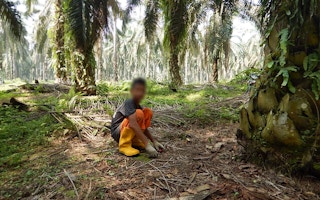Indonesian palm oil firm IndoAgri has unveiled a new sustainable palm oil policy in a bid to address documented environmental and labour abuses in its concessions, but environmental and labour activists have dismissed this effort as mere “corporate window-dressing”.
To continue reading, subscribe to Eco‑Business.
There's something for everyone. We offer a range of subscription plans.
- Access our stories and receive our Insights Weekly newsletter with the free EB Member plan.
- Unlock unlimited access to our content and archive with EB Circle.
- Publish your content with EB Premium.
Listed on the Singapore stock exchange, IndoAgri produces the palm oil, rubber, sugar cane, and other crops that go into the snack products of parent company IndoFood.
The firm came under fire last June when United States-based non-profit Rainforest Action Network, the International Labor Rights Forum (ILRF) and Indonesian NGO OPPUK documented extensive exploitation and worker safety violations on its concessions.
These concessions were operated by IndoAgri subsidiaries PT Salim Ivomas Pratama (PT SIMP) and PT PP London Sumatra Indonesia (Lonsum).
IndoAgri’s ‘Sustainable Palm Oil Policy 2017’, which the company uploaded on its website on February 13 without a media announcement, is applicable to its own palm oil operations, smallholders, and third party suppliers. It supersedes IndoAgri’s prior sustainable sourcing policies, which were announced in 2013 and 2014, respectively.
Some of its commitments include getting all of its palm oil certified by the Roundtable on Sustainable Palm Oil—the industry association for sustainable palm oil—by the end of 2019, an immediate stop to the use of toxic pesticide Paraquat, and respecting labour rights such as the freedom to join unions and minimum wages as set by local governments where the company operates.
In Sumatra and Kalimantan, where the company has plantations, minimum wages range between 1,600,000 and 2,000,000 rupiah (US$119 - $150) per month.
While these commitments address many of the violations pointed out in the 2016 NGO expose, activists said it was a “failed attempt to adequately address the document abuses in IndoAgri’s operations”.
For instance, the sustainability policy did not include a grievance mechanism—that is, a transparent way for stakeholders to file complaints, and for the company to provide updates on progress in resolving any conflicts.
Instead, the company said it would adopt a conflict resolution mechanism that would “involve, as appropriate on a case by case basis, local government, village administrative teams and community elders”.
Eric Gottwald, senior legal and policy director, International Labor Rights Forum, noted that instead of adopting a grievance mechanism in line with international best practices, “IndoAgri has made only a vague commitment that will allow it to pick and choose which grievances it will address”.
Activists also criticised the company for failing to commit to adopting the High Carbon Stock Approach—which in the past few months has become the industry norm for deforestation-free plantation development—and obtaining independent, third-party verification that the company and its suppliers are complying with its sustainability commitments.
“
This type of corporate window dressing will not fool IndoAgri’s customers, financiers or the NGOs that are committed to holding the company accountable for its impact on workers, communities and our environment.
Robin Averbeck, senior campaigner, Rainforest Action Network
Campaigners also criticised IndoAgri and Indofood for refusing to formally acknowledge or address the documented labour abuses in their report, and pointed out that American food multinational PepsiCo was still at risk of abour violations being associated with its products.
This is because PepsiCo is involved in a joint venture with Indofood to make PepsiCo’s snack products in Indonesia.
PepsiCo, which last June had said that it did not directly source palm oil from IndoAgri, said it was nevertheless engaging with its joint venture partners to investigate and address the issues raised. It did not respond to a request for an update on the status of its engagement by publication time.
Meanwhile, RAN, OPPUK and ILRF called on Indofood to take action to plug these gaps in its environmental and social policy, and be transparent about its progress.
Standards that the company can adopt to achieve this include the High Carbon Stock Approach, the UN Guiding Principles on Business and Human Rights, and the Free and Fair Labor in Palm Oil Production: Principles and Implementation Guidance.
Robin Averbeck, senior campaigner, RAN, said: “The policy is flawed due to loopholes that allow deforestation and further delays on resolving documented violations of labor and land rights in its operations and those of its suppliers.”
“This type of corporate window dressing will not fool IndoAgri’s customers, financiers or the NGOs that are committed to holding the company accountable for its impact on workers, communities and our environment”, he added.








